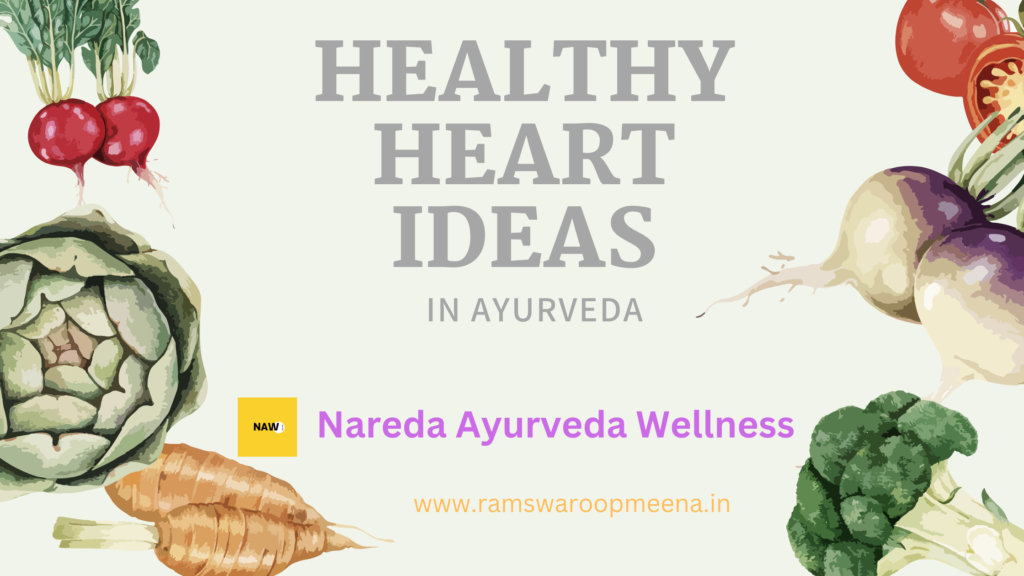10 Best Tips for a Healthy Heart in Ayurveda

Ayurveda, the ancient system of natural healing from India, emphasizes the balance between mind, body, and spirit to promote overall health and well-being. A healthy heart, or hridaya in Ayurveda, is central to maintaining vitality and longevity. With modern lifestyles increasingly linked to stress, poor diets, and sedentary habits, heart diseases have become a leading health concern worldwide. Ayurveda offers a holistic approach to keeping the heart strong by focusing on diet, lifestyle, and mental well-being.
This blog explores the 10 best tips from Ayurveda for maintaining a healthy heart, incorporating ancient wisdom that is increasingly validated by modern science. By adopting these practices, you can promote cardiovascular health, enhance your quality of life, and nurture your heart in a balanced, natural way.
1. Follow a Heart-Healthy Diet (Sattvic Diet)
Ayurveda classifies food into three categories: sattvic (pure), rajasic (stimulating), and tamasic (dull). A sattvic diet, rich in fresh, wholesome, and easily digestible foods, is considered the best for maintaining heart health. The heart thrives on nourishment that is light, fresh, and full of prana (life force), which is abundant in fruits, vegetables, whole grains, legumes, and nuts.
How to Do It:
- Eat a variety of fresh, seasonal vegetables and fruits, particularly those with cooling and hydrating properties like cucumbers, leafy greens, pomegranates, and apples.
- Include heart-friendly spices like turmeric, cumin, and coriander, which improve digestion and circulation.
- Avoid processed, fried, and heavy foods, as they clog the arteries and disturb the body’s doshas (vital energies: Vata, Pitta, Kapha).
Benefits:
- Lowers cholesterol and blood pressure.
- Reduces inflammation, a major contributor to heart disease.
- Provides essential nutrients that support cardiovascular function.
2. Maintain a Balanced Dosha for Healthy Heart
In Ayurveda, maintaining balance among the three doshas—Vata, Pitta, and Kapha—is essential for overall health, including the heart. Each dosha, when imbalanced, can lead to specific heart-related problems.
How to Do It:
- Vata (Air + Ether): Imbalance can lead to anxiety, irregular heartbeat, and palpitations. To balance Vata, prioritize grounding, warming foods like cooked vegetables, grains, and nuts. Practices like meditation and yoga can help calm Vata energy.
- Pitta (Fire + Water): Imbalance can cause high blood pressure and inflammation. To balance Pitta, avoid spicy, fried, and acidic foods. Focus on cooling foods like cucumbers, melons, and coconut water.
- Kapha (Water + Earth): Imbalance can result in high cholesterol and blockages in arteries. To balance Kapha, incorporate light, warm, and stimulating foods, such as lentils, bitter greens, and spices like ginger and turmeric.
Benefits:
- Prevents dosha-specific heart ailments.
- Creates overall harmony in the body, reducing stress on the cardiovascular system.
3. Incorporate Daily Meditation and Pranayama for healthy Heart
Ayurveda places great emphasis on the mind-heart connection, recognizing that stress and emotional imbalance can directly impact heart health. Meditation and pranayama (breathing exercises) are powerful tools for reducing stress, calming the mind, and improving heart function.
How to Do It:
- Practice Nadi Shodhana (alternate nostril breathing) to balance the flow of energy in the body and calm the nervous system. This practice helps regulate the heart rate and reduce stress-induced fluctuations in blood pressure.
- Meditation for 10-20 minutes daily can help reduce anxiety, lower cortisol levels, and promote emotional well-being.
Benefits:
- Lowers heart rate and blood pressure.
- Reduces chronic stress and anxiety, which are linked to heart disease.
- Enhances emotional balance, leading to better heart health.
4. Use Ayurvedic Herbs for Cardiovascular Support
Ayurveda has long recognized the power of herbs in supporting heart health. Certain herbs can strengthen the heart muscle, improve circulation, and reduce the buildup of cholesterol. Ayurvedic herbs are often used as supplements or in cooking to promote long-term heart health.
How to Do It:
- Arjuna: Known as a powerful heart tonic, Arjuna bark has been used for centuries to support cardiovascular function, improve circulation, and reduce blood pressure.
- Ashwagandha: This adaptogenic herb helps manage stress, one of the key contributors to heart disease. It also strengthens the heart and improves endurance.
- Triphala: A combination of three fruits—Amalaki, Bibhitaki, and Haritaki—Triphala helps cleanse the digestive system, reduce cholesterol, and improve heart function.
Benefits:
- Strengthens the heart muscle and improves blood circulation.
- Lowers bad cholesterol (LDL) levels and reduces plaque buildup.
- Supports emotional well-being, reducing stress-related heart conditions.
5. Exercise Regularly, but Moderately for healthy Heart.
Ayurveda advocates for regular physical activity to keep the heart and body in optimal condition, but it also emphasizes moderation. Over-exertion can aggravate Vata and Pitta doshas, potentially leading to stress on the cardiovascular system.
How to Do It:
- Engage in moderate activities like yoga, walking, swimming, or cycling. These exercises promote cardiovascular health without stressing the heart.
- Avoid overly strenuous workouts that leave you exhausted or overheated, as this can cause dosha imbalances, particularly in Vata and Pitta types.
Benefits:
- Improves circulation and strengthens the heart.
- Reduces stress and helps maintain healthy blood pressure levels.
- Promotes balance among the doshas, supporting overall well-being.
6. Get Adequate Sleep
According to Ayurveda, sleep is essential for healing and maintaining balance in the body. Inadequate or poor-quality sleep can disturb the heart’s function and aggravate conditions like hypertension and stress, which are detrimental to healthy heart.
How to Do It:
- Aim for 7-8 hours of quality sleep each night. A consistent sleep schedule supports the body’s natural rhythms.
- Incorporate calming rituals before bedtime, such as drinking warm milk with a pinch of nutmeg or practicing Abhyanga (self-massage with warm oil), to promote restful sleep.
Benefits:
- Reduces the risk of high blood pressure and heart disease.
- Enhances recovery and repair of the cardiovascular system.
- Promotes mental clarity and reduces stress.
7. Practice Abhyanga (Self-Massage) with Heart-Healthy Oils
Abhyanga, the Ayurvedic practice of self-massage, is a nurturing ritual that promotes circulation, reduces stress, and balances the doshas. Massaging the body with warm, heart-healthy oils can improve circulation and relax the nervous system, directly benefiting the heart.
How to Do It:
- Use heart-nourishing oils like sesame, almond, or olive oil for your daily self-massage. Warm the oil slightly before massaging it into your body in gentle, circular motions.
- Focus on massaging around the heart area and the extremities to enhance blood flow and relax the body.
Benefits:
- Stimulates circulation and promotes healthy blood flow.
- Reduces stress and anxiety, both of which can negatively impact heart health.
- Balances the body’s doshas, enhancing overall well-being.
8. Manage Stress with Ayurveda’s Mental Health Techniques
Chronic stress is one of the biggest contributors to heart disease, as it leads to hypertension, high cortisol levels, and inflammation. Ayurveda emphasizes the importance of managing stress through holistic practices that balance the mind and emotions.
How to Do It:
- Incorporate daily relaxation techniques like yoga, meditation, and pranayama to calm the mind and reduce the physical effects of stress.
- Utilize Ayurvedic herbs like Brahmi and Ashwagandha, known for their calming properties, to support mental health and resilience against stress.
Benefits:
- Lowers blood pressure and reduces the risk of stress-related heart conditions.
- Promotes emotional balance and mental clarity.
- Enhances the body’s ability to cope with stress, reducing its impact on the heart.
9. Stay Hydrated with Warm Water and Herbal Teas
Proper hydration is crucial for maintaining good heart health. In Ayurveda, drinking warm water and herbal teas helps keep the body’s channels clear, promoting healthy blood circulation and reducing strain on the heart.
How to Do It:
- Drink warm water throughout the day to help cleanse the digestive system and improve circulation.
- Include herbal teas like hibiscus, ginger, and tulsi (holy basil), which are known for their heart-supporting properties.
Benefits:
- Improves circulation and reduces the risk of blood clots.
- Helps the body eliminate toxins that can accumulate and affect heart function.
- Supports overall hydration, which is essential for maintaining healthy blood pressure levels. and healthy heart.
10. Cultivate Loving-Kindness and Positive Emotions
Ayurveda recognizes the powerful impact that emotions have on physical health, particularly the heart. Positive emotions like love, kindness, and compassion nourish the heart, while negative emotions like anger, fear, and jealousy can harm it.
How to Do It:
- Practice daily gratitude or loving-kindness meditation (also known as Metta meditation) to foster positive emotions.
- Engage in activities that bring joy and fulfillment, as these emotions are deeply nourishing for the heart.
Benefits:
- Reduces the emotional stress that can contribute to heart disease.
- Promotes a sense of inner peace, reducing the risk of hypertension and anxiety.
- Strengthens the mind-heart connection, leading to overall improved well-being.
Conclusion
Ayurveda provides a comprehensive, holistic approach to heart health that goes far beyond mere physical care. By addressing the mind, body, and spirit, this ancient system offers sustainable practices to prevent heart disease, reduce stress, and maintain overall vitality. The ten tips discussed—ranging from diet and exercise to stress management and emotional well-being—can be incorporated into daily life to protect and nurture your heart naturally.
By following these Ayurvedic principles, you not only take steps toward preventing heart disease but also move toward a balanced, joyful, and fulfilling life. In today’s world, where cardiovascular health is increasingly at risk, Ayurveda offers a timeless and effective approach to keep the healthy heart and strong.
